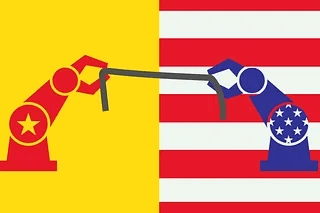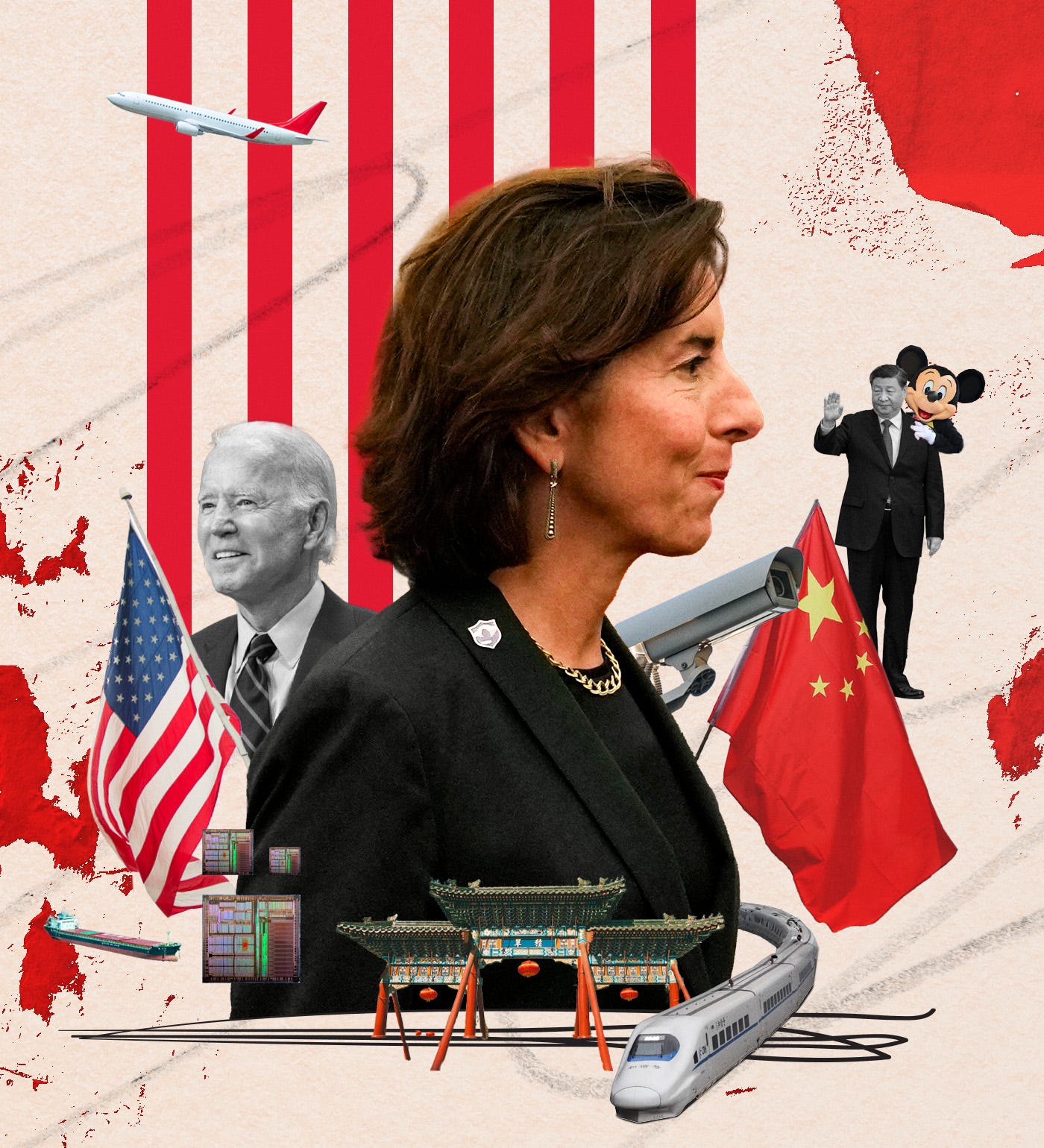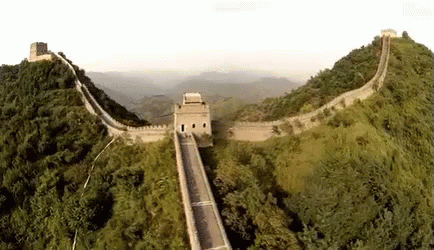This Sunday’s ‘AI: in my View’, necessarily continues a theme I’ve been focused on ‘AI: Reset to Zero’ for a while now (“AI: Threading the China needle”, and last week’s “AI: Bottom up vs Top down, China,” in particular). Three things catalyzed me to continue with this week’s ‘AI: In my View”, on the subject. One is the fourth visit by a senior US government representative to China in recent weeks, second is the release of an ‘against the odds’ flagship smartphone' by a major Chinese tech company, and third is watching ‘Jurassic Park’, the original 1993 movie, for yet another time. Let me make my case.
To begin, let me reiterate that the rising geopolitical tensions between the US and China are the key potential headwind in this AI Tech Wave vs the previous PC and Internet waves that led to trillions in GDP and wealth for the US and the world. My key point:
“Geopolitical realities will make it ‘insanely hard’ for our best entrepreneurs to take AI technologies and make the execution of their innovation work at global scale. Whether they’re doing it as startups or big tech incumbents. Governments can help by ‘threading the needle’ of their national political ‘Kabuki theater’ imperatives, while pragmatically managing the beneficial Math of global trade”.
“The politics are of course manifesting in the latest White House curbs on AI GPU export curbs on China, and the multi billion dollar Nvidia GPU buying binge by tech companies in China to get ahead of those curbs and bans.”
This week’s events accentuated the need for us to continue a laser-like focus on this issue, despite the difficult political issues and presumed imperatives.
So on the first item mentioned above, I was encouraged by the fourth visit by a major US political representative to China, US Commerce Secretary Gina Raimondo (a former Governor of Rhode Island, and VC no less). Despite the relatively few news headline breaking items from the visit, I believe the administration succeeded in continuing to ‘thread the needle’ between the national security and trade issues with China.
The founder and CEO of the Information, Jessica Lessin, who was part of the press team traveling with the Secretary in China, had an excellent summary of the trip and its nuances. Lot here between the lines. The title of the piece says it all:
“Excited and Terrified’: On a High-Stakes Trip to China, Gina Raimondo Confronts a Complex Future”.
She manages in a few minutes in the ‘back of a speeding motorcade through Shanghai’, to talk to the Secretary about '“AI, TikTok and Bejing’s ‘uninvestible’ present'‘.
A full read is highly recommended (and subscribing). But here is one key highlight for me:
“Last fall, Raimondo’s Commerce Department issued new export controls that prohibit U.S. companies from selling certain advanced semiconductors and the tools to build them to China. It was a big move—but one with a narrower scope than some in Washington had expected when news of the policy leaked. Nonetheless, China retaliated, banning the sale of some raw materials needed to build chips to the U.S.”
“In recent months, she also helped shape the president’s executive order restricting U.S. private equity and VC investors from funding AI and quantum computing in China. “I played a role to make sure that it was narrowly tailored,” she told me. “It’s in no one’s interest to have it be too broad. Because then it’s not enforceable.”
Threading the needle indeed. Lot there between the lines.
Which brings me to my second catalyst for this Sunday’s piece here, the indomitable will, drive, and creativity of China’s technology companies, be they State backed or not. We’ve already seen how China’s tech companies are making a dent outside of China. As I said in my earlier “Bottom up” piece:
“In the past three decades, the companies that lead the way were primarily from the US.”
“But this time, we’ve already seen the ‘insanely great’ execution by Chinese companies at scale globally.”
“I’m talking of course about the global success of TikTok, a Bytedance subsidiary, and the additional success of Chinese companies like Shein and Temu of late in the US in the ecommerce realm. Those three companies’ apps, along with Capcut, another Bytedance subsidiary, and a maker of mobile online tools, have been among the most popular apps globally on App stores from Apple and others.”
This week saw another Chinese company, Huawei, which has been even more focused on by US, European, and Western policy makers, show how they’re making their way through export restrictions. Washington Post says it all in their headline: “New phone sparks worry China has found a way around US tech limits”:
“As Commerce Secretary Gina Raimondo was visiting China earlier this week, a sea-green Chinese smartphone was quietly launched online.”
“It was no normal gadget. And its launch has sparked hushed concern in Washington that U.S. sanctions have failed to prevent China from making a key technological advance. Such a development would seem to fulfill warnings from U.S. chipmakers that sanctions wouldn’t stop China, but would spur it to redouble efforts to build alternatives to U.S. technology.”
“Huawei Technologies Co.’s new smartphone, the Mate 60 Pro, represents a new high-water mark in China’s technological capabilities, with an advanced chip inside that was both designed and manufactured in China despite onerous U.S. export controls intended to prevent China from making this technical jump. Those sanctions were first imposed by the Trump administration and continued under President Biden.”
For those interested in more technical details of the phone, I’d recommend this piece by the Verge. One gets the impression that the unintended consequences of western actions may be a much more capable Chinese semiconductor industry at scale:
“After Huawei began running out of its stockpile of existing chipsets, rumors emerged that the company had been working on a 5G chip using technology sourced from China. Nikkei Asia reported in July that Huawei wanted to restart production on 5G chips “as early as this year,” with China’s Semiconductor Manufacturing International Corporation (SMIC) set to start producing the company’s in-house 5G chip.”
“SMIC would reportedly use 7nm technology to produce the chip. That still isn’t as efficient as the 4nm and 3nm processes used by Taiwan Semiconductor Manufacturing Company (TSMC), which makes chips for big-name clients like Apple, Nvidia, and Google. Still, some speculate that leaving Chinese technology companies to their own devices (literally) could threaten the chipmaking business that the Biden administration is trying to build up in the US.”
China is finding a way. Which brings me to the third catalyst for this Sunday’s piece. Watching Jurassic Park from 1993 again this weekend. A key line from the movie, and the highly recommended Michael Crichton book for me, has always been Math Professor Ian Malcolm (the inimitable Jeff Goldblum in the movie of course), says at the end of this exchange:
“Dr. Ian Malcolm: John, the kind of control you're attempting simply is… it's not possible. If there is one thing the history of evolution has taught us it's that life will not be contained. Life breaks free, it expands to new territories and crashes through barriers, painfully, maybe even dangerously, but, uh… well, there it is.”
”John Hammond: [sardonically] There it is.”
”Henry Wu: You're implying that a group composed entirely of female animals will… breed?”
”Dr. Ian Malcolm: No. I'm, I'm simply saying that life, uh… finds a way.”
Full dialog here in text and video for those thirsting for a refresh.
Countries always find ways around sanctions and restrictions. In recent memory, it’s the up and down efficacy of the sanctions against Putin’s Russia, to the so many ways that China, via it’s government and private companies is earnestly focused on finding a way forward. Especially when it concerns technologies that mean everything for their people’s lives going forward.
Not to mention their bottom up and top down need for RESPECT. Here’s a summary from the first virtual meeting between Chinese President Xi JinPing and US President Joe Biden in late 2021:
“Treating China with respect is the first of the three principles that Xi mentioned to Biden during their meeting. The other two were peaceful coexistence and win-win cooperation.”
Respect of course is also a key driver of India’s focus on AI, which I also outlined.
And China? This is a nation that built a ‘Great Wall’ over 13,000 miles long over a millennium when it felt threatened.
Enough to go around the continental United States, and have some left over for Alaska. Regardless of the costs over time. Remember, they helped build the US transcontinental railroad that linked ‘Sea to Shining Sea’. They can infrastructure the seeming impossible. So yes, they can find a way.
And we of course know how Jurassic Park turned out (Spoiler Alert?).
And there were then the very many sequels that continue on that theme.
The US government and its allies have indeed one of the most complex tasks ahead. But we should keep an eye on the long-term prize, the competitiveness of the economies and companies deemed on the right side of history.
The world has no illusions about the top down political realities of China. But the need to ‘thread the needle’ persists. Because China too will ‘find a way’ otherwise. Stay tuned.
(NOTE: The discussions here are for information purposes only, and not meant as investment advice at any time. Thanks for joining us here)










